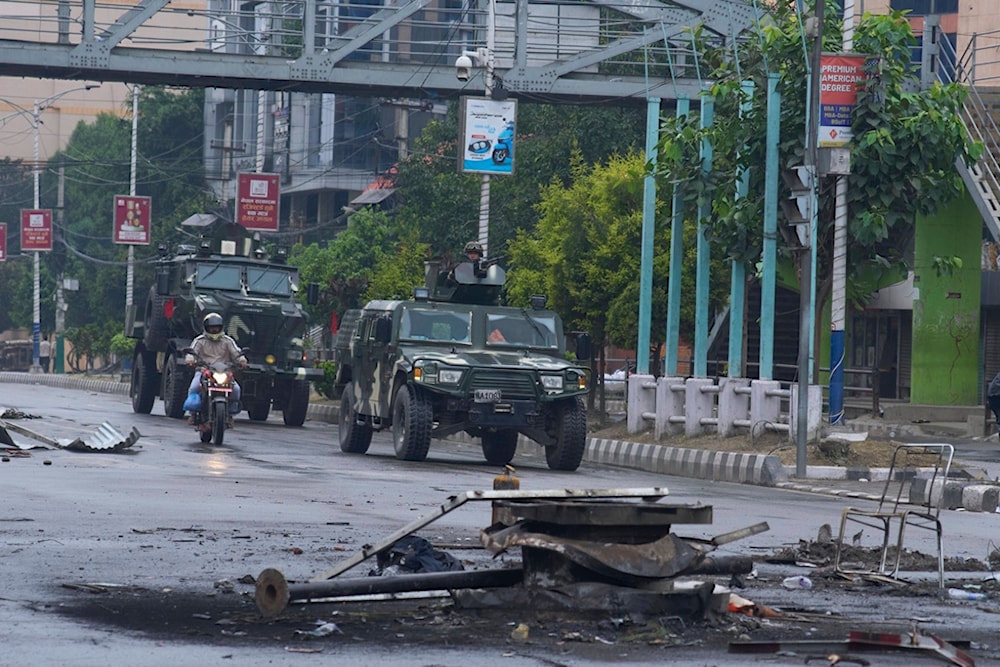Nepal deploys army to restore order after PM resigns amid unrest
The Nepali government takes decisive action to safeguard national stability, urging dialogue and unity after violent protests shake the capital.
-

Nepalese army personnel patrol the streets in Kathmandu, Nepal, Wednesday, September 10, 2025. (AP Photo/Niranjan Shrestha)
Nepali troops fanned out across Kathmandu on Wednesday, aiming to restore calm after furious crowds torched parliament and forced the prime minister to resign in the deadliest political violence the Himalayan nation has seen in two decades.
The unrest began on Monday as demonstrations in the capital over a ban on unregistered social media platforms and to protest rising corruption, but quickly escalated into a nationwide revolt. Government buildings were set ablaze after security forces launched a crackdown that left at least 19 people dead.
The sudden spiral into violence stunned the country of 30 million. Nepal’s military issued a stark warning against “activities that could lead the country into unrest and instability.”
On Wednesday, smoke still billowed from charred government offices, residences of politicians, and supermarkets targeted by protesters, according to AFP. Streets remained strewn with the remains of burned-out cars and tyres.
"It is quiet today. The army is on the streets in all places," said one soldier manning a makeshift checkpoint, declining to give his name as he was not authorized to speak to the press.
Among the targets of the violence was the home of KP Sharma Oli, the 73-year-old former prime minister and head of the Communist Party. Mobs attacked and set his residence on fire on Tuesday, prompting him to step down in hopes of opening “steps towards a political solution.” His current whereabouts remain unknown.
Army chief appeals for dialogue
In a televised address Tuesday night, Nepal’s Army Chief General Ashok Raj Sigdel called for restraint and negotiations.
"To provide the nation with a peaceful resolution, we urge all groups involved in the protest to call it off and engage in dialogue," he said.
The International Crisis Group described the moment as a “major inflection point in the country’s uneasy experience with democratic rule.”
UN Secretary-General Antonio Guterres also appealed for calm, with spokesperson Stephane Dujarric urging “restraint to avoid a further escalation of violence.”
From New Delhi, Indian Prime Minister Narendra Modi stated that “the stability, peace, and prosperity of Nepal are of utmost importance to us.”
Next steps uncertain
What comes next remains unclear. Constitutional lawyer Dipendra Jha, quoted by AFP, said, “The protesters, the leaders they trust, and the army should come together to pave the way for a caretaker government.”
Crisis Group analyst Ashish Pradhan echoed that view, warning that a “transitional arrangement will now need to be charted out swiftly and include figures who still retain credibility with Nepalis, especially the country’s youth.”
It is worth noting that young people between 15 and 40 account for nearly 43 percent of the population, according to official statistics, yet face an unemployment rate near 10 percent. World Bank data places Nepal’s GDP per capita at just $1,447.
Wider context
On Monday, Nepal’s government reversed the ban on 26 major social media apps and messaging services, just hours after protests over the blockade intensified and left at least 19 people dead and more than 200 injured.
Among the homes set ablaze were those of Sher Bahadur Deuba, head of the largest party Nepali Congress, President Ram Chandra Poudel, Home Minister Ramesh Lekhak, and Communist Party of Nepal leader Pushpa Kamal Dahal.
The restrictions stemmed from new rules requiring platforms to register, establish points of contact, and designate resident grievance and compliance officers.
Major platforms, including Facebook, Instagram, WhatsApp, YouTube, Tencent, Snapchat, Pinterest, and X, were initially blocked for missing the registration deadline.
Nepal had previously blocked Telegram in July and lifted a nine-month ban on TikTok last August after the platform complied with local regulations.
Authorities cited concerns over fake accounts, hate speech, and other criminal activity on these platforms.
Read more: Patrushev: Color revolutions are main tool of American-style democracy

 4 Min Read
4 Min Read










